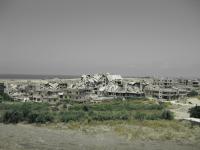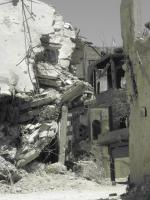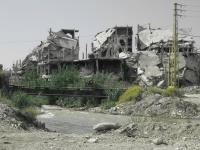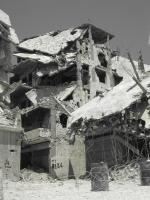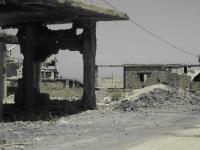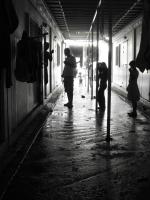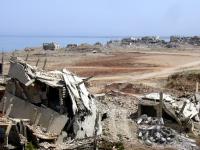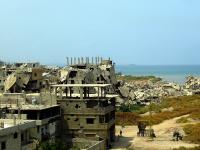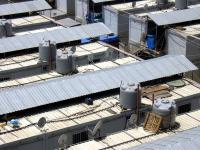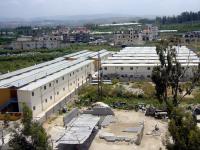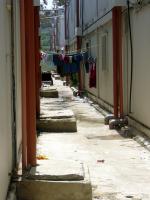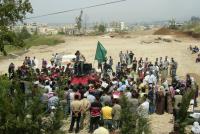About two years ago, a
battle broke out between the Lebanese army and the militant group Fatah
al-Islam in the Palestinian refugee camp of Nahr al-Bared in northern
Lebanon. The summer-long battle concluded in September 2007 and the
camp was totally destroyed -- the rubble indicating that the
destruction was systematic, most likely committed by the Lebanese army.
After several delays, the UN-mandated core of the camp, the so-called
"old camp," has meanwhile been cleared of approximately 600,000 meters
of rubble. Yet, reconstruction hasn't begun and residents are still
unable to enter the old camp, the access of which is controlled by the
Lebanese army, and displaced refugees are increasingly resentful.
On 9 March 2009, the authorities responsible for the reconstruction of Nahr al-Bared participated in a ceremony that was intended to silence critics and give the appearance to the Lebanese and foreign media that reconstruction of the camp was guaranteed. Under the protection of the Lebanese army, Khalil Makkawi, chairman of the Lebanese Palestinian Dialogue Committee (LPDC); Abbas Zaki, Representative of the Palestine Liberation Organization (PLO) in Lebanon; the Lebanese Minister of Information, Tarek Mitri; and Karen AbuZayd, the General Commissioner of the UN agency for Palestine refugees (UNRWA), were chauffeured into the camp. During the ceremony, the foundation stone for the reconstruction of Nahr al-Bared was laid, the lack of funding by the donor countries was criticized and empty phrases were offered. Delicate subjects such as the siege of the camp by the army weren't mentioned. The former residents of the camp were locked out behind barbed wire, while Lebanese soldiers kept them quiet. When the crowd tried to enter the closed area, they were beaten and pushed back by soldiers, who even used an armored personal carrier.
More than two months after the ceremony, Nahr al-Bared's old camp has yet to see any reconstruction work. According to the Preliminary Master Plan jointly prepared by the community-based Nahr al-Bared Reconstruction Commission for Civil Action and Studies (NBRC) and UNRWA, reconstruction was to start by May 2009. Since refugees are forbidden from entering the area, various stories about the fate of the foundation stone and the old camp have started to circulate. Some say the stone was stolen the day after the ceremony, others claim it was destroyed. Rima, who rebuilt her cabinet maker's workshop, guesses that the area of the old camp will be used to grow potatoes in the future.
The slow speed of the clearing and the fact that the reconstruction hasn't yet begun reinforces the doubts of the displaced that they will ever return to their camp. Mahmoud, a young musician, explains that "Every few months they have another excuse for the delays. They used to point at a lack of construction machines, then said there were still too many unexploded ordnance devices among the rubble and finally it seems that the discovery of ancient pillars seems to prevent the work." Many refugees don't believe that the camp will ever be rebuilt. Salim, a young shoemaker, asks, "Why have they actually destroyed the camp? I don't think it was for rebuilding it!"
On 13 May, a car equipped with loudspeakers and driven by Fatah party supporters announced the visit of PLO representative Abbas Zaki. Khaled, a shopkeeper in the Corniche neighborhood in the new camp, which is not under the UN's mandate, silently stood by. Once the car had passed, he said, "Look, Abbas Zaki comes to lie to us. He wants to lessen the anger of the people in order to avoid heavy protests at the upcoming second anniversary of the war." Khaled added that he wouldn't attend Zaki's speech, as he was convinced that it would be filled with lies and empty promises and he wouldn't have the opportunity to speak.
The following day, Zaki's
convoy reached the southern edge of Nahr al-Bared. The chosen location
for his speech was a building outside the camp. Camp residents believe
that this was a deliberate decision made after the March stone-laying
ceremony when some attending the event hurled insults at Zaki and he
left through the southern exit of the old camp, thus avoiding the angry
crowd gathered at the northern entrance.
In his speech, Zaki spoke about Palestinian unity, the new Israeli government and many other issues, aimed at gaining the audience's support (the crowd were mostly Fatah supporters). However, he hardly spoke about Nahr al-Bared. After Zaki's speech, attendees were given the opportunity to ask questions and chaos ensued. Zaki's bodyguards quickly surrounded him and the audience was told to submit their questions on paper. Some residents, upset about their situation, believed this was an attempt to silence dissent. The majority of questions dealt with the siege and reconstruction of the camp, unemployment and the situation in the temporary shelters, which residents call the "barracks." One resident managed to address Zaki verbally, stating that "We don't want any improvements of the barracks, we don't want any barracks at all!" After answering some questions, Zaki's convoy drove off -- without ever visiting the camp.
Members of the other two main PLO factions, the Democratic Front for the Liberation of Palestine and the Popular Front for the Liberation of Palestine, were present during the speech and stayed silent to demonstrate unity within the PLO. In the streets however nobody held his or her tongue. Comments on Zaki normally included one of the following words: "liar," "traitor" or "pig."
The Committee of the Residents of Nahr al-Bared organized a rally the day after Zaki's visit. Although relatively unstructured, the group is quite active and was created in reaction to the inactivity of the camp's Popular Committee (which consists only of delegates from the main PLO parties). The protest march began after the Friday prayer at al-Quds mosque and proceeded along army posts at the edge of the old camp to a construction site in the south of the camp. At the site, UNRWA flattened yet another piece of land and was preparing for the building of the fifth unit of temporary shelters. In their chants, the protesters demanded the return to the old camp and the end of the siege on Nahr al-Bared and the abolishment of the Lebanese army's permit system controlling movement to and from the camp. During the rally, Sheikh Ismail Abu Ibrahim, the young imam of the al-Quds mosque, and another spokesperson of the residents' committee, known as Abu Tayyeb, demanded the immediate end to the construction of the new barracks as long as the reconstruction in the old camp was delayed. Abu Tayyeb further criticized corruption and nepotism in the reconstruction process and asked rhetorically, "Why was the rebuilding of the old camp constantly being delayed?" The implicit answer was that the Lebanese authorities did not actually intend to rebuild the camp. He told the crowd, "The laying of the foundation stone and the ceremony were nothing but a lie!"
Videoclip about the rally against the construction of new barracks on May 14th 2009

